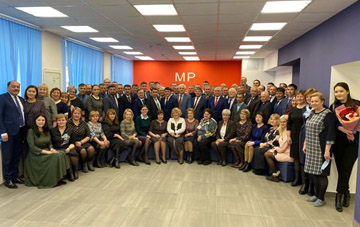
The agenda includes discussion of the new programme for secondary educational institutions “Professionality”, developed by the Ministry of Education of Russia and launched in 2022. According to the statistics, there are more than 3.6 thousand secondary educational institutions in our country. About 3.3 million students study there: more than 2 million – for free, using the budget funds. If in the early 2000s only 10-12% of 9th grade graduates entered colleges after school, today this figure reaches 60%. This is a huge resource that the country needs so much right now – young people who are preparing to master professional skills and enter adulthood. The new vocational training programme “Professionalism” is designed just for them. Its goal is to quickly and efficiently train young people in the skills needed by the market. In other words, to provide the country with working hands and middle-level personnel.
The main goal of the Board of Directors of vocational educational organizations of the Republic of Bashkortostan is to contribute to the sustainable and innovative development of the system of vocational educational organizations of the Republic of Bashkortostan in order to ensure the high quality training, retraining and advanced training of personnel for the sectors of the economy, the needs of federal and regional labour markets.
The task is to achieve the priority development of educational institutions in relation to the demands of the labour market, to bring the system of training mid-level personnel as close as possible to the demands of the market in different regions and specific industries; and also to make the college students education less costly for the budget, to shift part of the financial responsibility for students to companies and industries in need of workers, where a young person can presumably be able to work. They will also share their experience, practical knowledge and skills with young people. This will not only provide the industries in need with workers, but also increase the employment of secondary educational institution graduates up to 90%. Students will study not for abstract employment, but for a specific position in specific companies.
“Professionality” can be called a new level of secondary vocational education, which practically guarantees employment. According to the Deputy Prime Minister of Russia Tatyana Golikova, the new programme is based on three main innovations, which, before being accepted for implementation everywhere, need to be “run in”. The first is the involvement of professional community representatives, “acting market players”, who will also become the investors in the education system. The second is the reducing time for training while increasing its intensity. And the third is the creation of various youth initiatives centres in educational institutions.
Professionality Specialties
According to the Institute for the Development of Vocational Education, more than 100 professions and specialties from the railway, pharmaceutical, mining and oil and gas industries, the nuclear industry, metallurgy, agriculture, mechanical engineering and light industry will fall under the new educational standards with reduced training periods. The training of personnel for these areas will be covered by the new programme in the first place.
The Republic of Bashkortostan was one of the first subjects of Russia to pass the competitive selection and become a participant in the federal project “Professionality”.
Mentoring is a universal technology for transferring experience, knowledge, developing skills, competencies, meta-competences and values through the informal mutually enriching communication based on trust and partnership.
The mechanism for introducing the priority form of mentoring “employer-student” The form of mentoring “employer-student” involves the interaction of a student mastering secondary vocational education programmes and a representative of the real sector of the economy (if possible, a partner business), in which the mentor activates the professional and personal potential of the student, enhances their motivation for learning and self-realization. In the process of interaction between the mentor and the mentee, the development of corporate and professional culture takes place. Obtaining specific professional skills is necessary for starting a working career.
The purpose of the implementation of this form is to provide students with updated professional experience and the development of personal qualities necessary for conscious goal setting.
Tasks: professional self-realization and employment.
Forms of mentoring:
“Teacher-student” involves the interaction of the student and the teacher, in which the mentor activates the professional and personal potential of the student, enhances their motivation for self-realization
“Employer-student” involves the interaction of POO (Limited Liability Enterprise) and representatives of regional businesses in order to obtain relevant knowledge and skills by students for further professional self-realization

 March 25th, 2022
March 25th, 2022  ALINA B.
ALINA B.  Posted in
Posted in